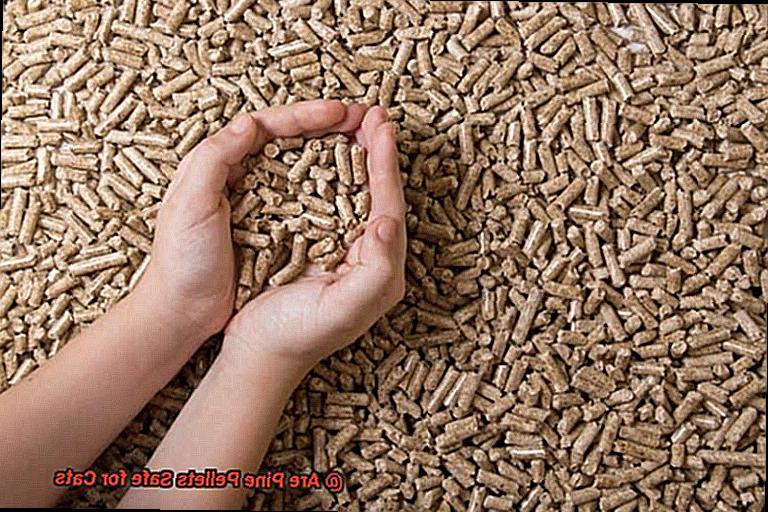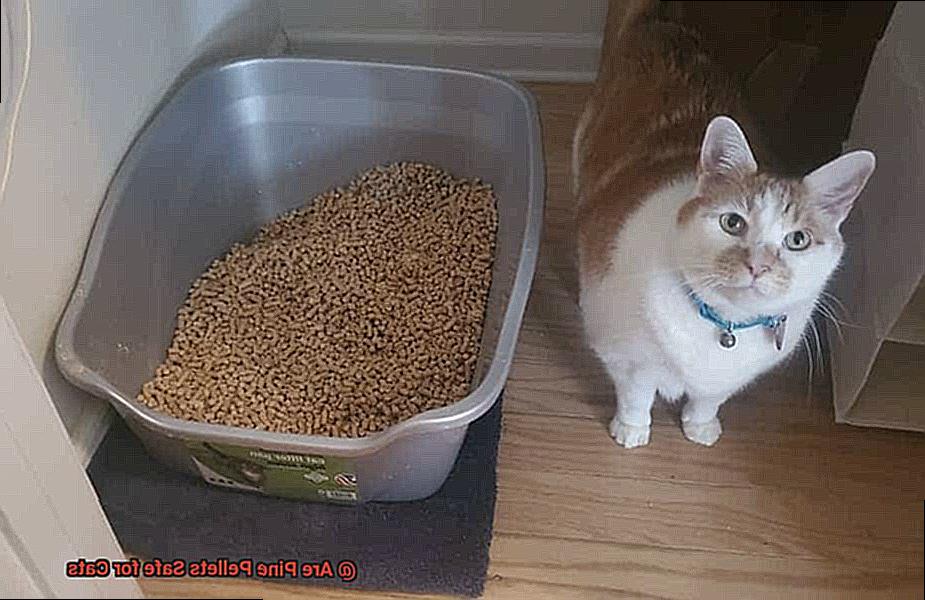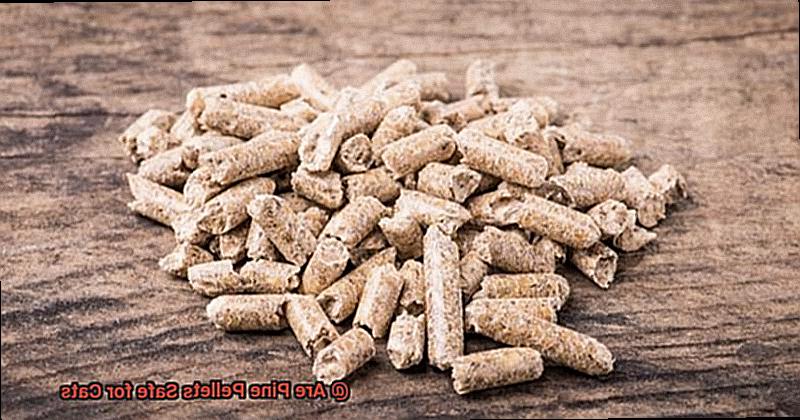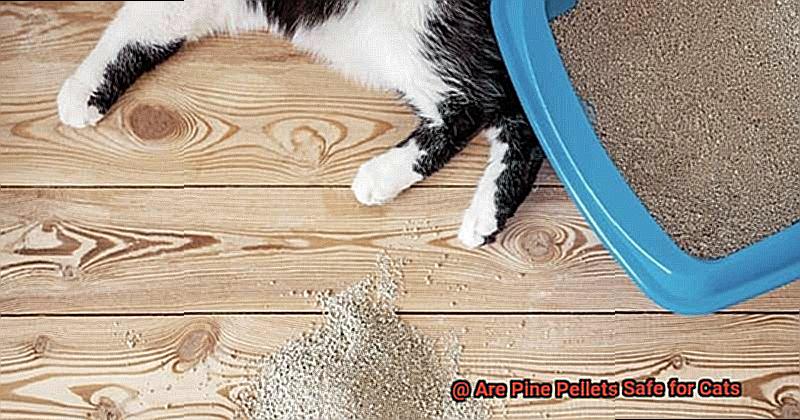As a cat parent, you’re always on the lookout for safe and effective litter options that keep your furry friend healthy and happy. With so many choices out there, it can be overwhelming to decide which one to use. One option that has been making waves in the cat litter world is pine pellets. But before you make the switch, it’s important to ask yourself: are pine pellets safe for cats?
If you’re not familiar with pine pellets, they’re made from compressed sawdust and offer a biodegradable alternative to traditional clay litter. They’re highly absorbent and do an excellent job at controlling odors while being more eco-friendly than other options. However, like with any new product you introduce to your cat, it’s essential to do your research first.
In this blog post, we’ll take a closer look at the safety concerns surrounding pine pellets and whether they’re suitable for your feline companion. We’ll explore the potential risks and benefits of using them, including possible allergic reactions or ingestion issues. Additionally, we’ll examine how using pine pellets as a litter option can positively impact the environment.
So let’s dive in together and explore whether pine pellets are indeed safe for your beloved cat.
Potential Hazards of Pine Pellets for Cats
Choosing the right litter for your cat is an important aspect of pet care, but it’s not always easy to know what to look for. Pine pellets may seem like a great option due to their absorbency and natural scent control, but there are some potential hazards that pet owners should be aware of.
One of the biggest concerns with pine pellets is the dust they can produce. This dust can cause respiratory issues for both cats and humans, such as coughing and sneezing. In addition, some pine pellets may contain chemicals like phenols or aromatic hydrocarbons that can be harmful to cats if ingested or inhaled. These chemicals have been found to cause liver and kidney damage, as well as respiratory problems.

Another potential hazard of pine pellets for cats is their high absorbency. While this may seem like a benefit at first, if the litter is not changed frequently enough it can lead to urinary tract infections and other health problems. Moreover, if a cat ingests the pellets while grooming themselves, they could develop blockages in their digestive system.
It’s important to note that not all pine pellets are created equal. Some brands utilize a process that removes the majority of the phenols from the pellets, making them safer for cats. When considering using pine pellet litter for your cat, make sure to carefully read the packaging and research the brand before purchasing.
If your cat has pre-existing respiratory or gastrointestinal issues, it may be best to avoid using pine pellet litter altogether and opt for a different type of litter that is better suited to their needs. Always monitor your cat’s health and behavior when using pine pellets as litter and consult with your veterinarian if any issues arise.
Different Types of Pine Pellets
Pine pellets may be a natural and efficient option, but it’s essential to understand the different varieties available and their potential risks.

Kiln-dried pine pellets are the most popular option for cat litter due to their ability to remove moisture and kill bacteria. These pellets have been heated to eliminate any harmful microorganisms, making them a safe choice for your cat. However, non-kiln-dried pine pellets maintain a higher moisture content and have a greater potential for bacterial growth, resulting in unpleasant odors and an unsanitary environment.
Additionally, some pine pellets may contain hazardous additives or chemicals that can harm your cat’s liver and kidneys. When purchasing pine pellet litter, it’s crucial to read the label carefully, avoid any products with added fragrances, dyes or other potentially dangerous substances.
As an expert on different types of pine pellets, I recommend selecting high-quality kiln-dried pine pellets that are free from harmful additives or chemicals. It’s vital to monitor your cat’s behavior and health closely after transitioning to a new litter type to ensure they are adapting well.
In conclusion, choosing the right type of pine pellet for your cat’s litter box is crucial for their health and well-being. Kiln-dried pine pellets are considered safe if used appropriately and chosen carefully. Always read the label, avoid harmful additives or chemicals, and keep a close eye on your cat’s health.

Researching Brands and Reading Labels
Pine pellets may seem like a natural and efficient option, but it’s crucial to do your research before making a decision. Let’s explore why researching brands and reading labels is so important when considering pine pellets as a litter option for cats.
Firstly, you need to look for a brand that uses 100% natural pine without any added chemicals or fragrances. These additives can potentially be harmful to cats, causing respiratory issues or skin irritation. By selecting a brand that uses natural ingredients, you can feel confident in providing an environment that is safe for your cat.
In addition to this, it’s essential to read the label carefully to ensure that the pine pellets are specifically designed for use as cat litter. Some brands may use pine pellets intended for other purposes, such as fuel or animal bedding, which may contain different ingredients or have different properties that could be harmful to cats. By choosing a brand that is specifically designed for cats, you can guarantee that your feline friend’s health and safety are being taken seriously.
Another factor to consider is the size and shape of the pellets. Pellets that are too large or rough may be uncomfortable for cats to walk on or cause irritation to their paws. Therefore, it is recommended to select pellets that are small and smooth in texture. This will ensure that your cat is comfortable while using their litter box, making for happier kitties.

In conclusion, researching brands and reading labels is an essential step in ensuring the safety and comfort of cats when using pine pellets as litter. It enables you to select a high-quality brand that uses natural ingredients and is specifically designed for cats, providing a safe and effective litter option for your furry friends. So next time you’re shopping for cat litter, take the time to research brands and read labels to make an informed decision about what’s best for your cat.
Pre-Existing Respiratory or Gastrointestinal Issues
One crucial aspect of their well-being is the type of litter you choose for their litter box. Although pine pellets may seem like an attractive choice, it’s crucial to take into account any pre-existing respiratory or gastrointestinal issues your cat may have before using them.
Pine pellets are made from compressed sawdust from pine trees and release a natural compound called phenols. These compounds can be harmful to cats if inhaled or ingested excessively. Cats with pre-existing respiratory issues such as asthma or bronchitis may be more sensitive to these compounds, resulting in coughing, wheezing, and difficulty breathing.
Additionally, if your cat has pre-existing gastrointestinal issues such as inflammatory bowel disease or chronic diarrhea, the use of pine pellets may worsen these conditions. The ingestion of pine pellets can cause stomach distress, vomiting, and diarrhea in some cats. Ingesting the pellets can also lead to blockages in the intestines, which can be life-threatening if left untreated.

It is essential to discuss the use of pine pellets with your veterinarian if your cat has pre-existing respiratory or gastrointestinal issues before using them as a litter option. Your vet may suggest alternative litter options that are less likely to irritate your cat’s condition. If you do choose to use pine pellets, keep a close eye on your cat for any signs of respiratory distress or gastrointestinal discomfort and stop using them if required.
Benefits of Using Pine Pellet Litter
Look no further than pine pellet litter for a more eco-friendly and natural solution.
Made from compressed sawdust, pine pellet litter is a sustainable and natural option for your furry friend. But the benefits don’t stop there. Here are just a few reasons why pine pellet litter is an excellent choice for both you and your cat:
Firstly, pine pellets are designed to absorb moisture and odors effectively, ensuring that your litter box stays fresh and clean for longer periods. Say goodbye to the constant scooping and cleaning that comes with traditional clay-based litters. Additionally, pine pellets last up to four times longer than other types of litter, reducing the amount of waste you generate and making your life easier and more eco-friendly.
What’s more, pine pellet litter is completely dust-free, making it an excellent choice for cats with allergies or respiratory issues. You’ll breathe easier knowing that you and your furry friend are safe from harmful dust particles.

And if you’re concerned about the health and safety of your pet, rest assured that pine pellets are completely non-toxic. Unlike traditional litters that can contain harmful chemicals and additives, pine pellets are made from natural materials, making them a healthier choice for your pet. Plus, they are biodegradable and can be safely disposed of in your compost bin or backyard.

In conclusion, pine pellet litter is an affordable, eco-friendly, and natural option that provides excellent odor control, requires less maintenance, and is dust-free. If you’re looking for a safe and natural alternative to traditional clay-based litters, pine pellet litter is an excellent choice for your furry companion. Give it a try today.
Tips for Choosing the Right Type of Litter
Choosing the right type of litter is a crucial aspect of cat care, as it can impact their health and well-being. With so many options available, it can be overwhelming to decide which one to choose. To help you make an informed decision, here are seven tips to keep in mind when selecting a litter for your cat.
Consider Your Cat’s Preferences
Cats are picky creatures, and they have their own individual preferences when it comes to litter. Some cats prefer scented or unscented litters, while others may prefer a certain texture. It’s important to choose a litter that your cat will be comfortable using to ensure they continue using the litter box consistently.
Avoid Clumping Clay Litter
Clumping clay litter may be convenient, but it can be harmful if ingested by cats. This type of litter can also produce a lot of dust, which can irritate your cat’s respiratory system. Opting for a safer alternative such as natural materials like pine, paper or wheat is a better option.
Opt for Natural Ingredients
Natural-based litters are generally safer for cats and better for the environment than traditional clay litters. They are made from biodegradable materials and don’t contain any harmful chemicals or additives that could harm your cat.
Consider Dust Levels
Some litters can produce a lot of dust, which can cause respiratory issues for both you and your cat. If you or your cat have sensitive respiratory systems, opt for a low-dust litter that will not trigger any health issues.

Check for Chemicals
Some litters contain chemicals such as fragrances or deodorizers that can be harmful to cats. It’s best to avoid these types of litters and opt for unscented options instead.
Consider the Cost versus Quality
While the price may be a factor in your decision, investing in a high-quality litter that will keep your cat healthy and happy is worth it. Cheaper options may not be as effective or safe as more expensive ones, so choose a litter that is of good quality and fits your budget.
Keep Your Cat’s Health in Mind
If your cat has any health issues or sensitivities such as allergies or asthma, it’s crucial to choose a litter that won’t exacerbate these conditions. Consult with your veterinarian if you’re unsure which type of litter is best for your cat.
In conclusion, choosing the right type of litter for your cat takes careful consideration.
Alternatives to Pine Pellet Litter
While pine pellet litter has been a popular choice due to its natural ingredients and low dust levels, there are several alternatives available on the market.
One such option is clay-based litter. Made from natural clay, it offers high absorbency and easy maintenance. However, it’s important to note that the dust produced by this litter can be harmful to cats with respiratory issues. If you’re looking for an odor-controlling and low-dust alternative, silica gel cat litter is a great choice. It’s highly absorbent and controls odors effectively, although it can be pricier than other types of litter.
For eco-conscious cat owners, natural alternatives like corn-based or wheat-based litter are ideal. These litters are biodegradable and environmentally friendly while being clumping and highly absorbent, making them easy to clean and maintain. However, they may not control odors as effectively as other types of litter.
If you’re looking for a sustainable option, recycled paper-based litters are also an excellent choice. Made from recycled paper, these litters are biodegradable and highly absorbent while controlling odors effectively. However, it’s worth noting that they can be more expensive than other types of litter and some cats may not take well to the texture.
When deciding on an alternative to pine pellet litter, it’s essential to consider your cat’s individual needs and preferences. Consider any health or environmental concerns you may have before making a decision. With so many options available, you’re sure to find the perfect litter type that suits both you and your feline friend.
Safety Precautions When Using Pine Pellet Litter
Pine pellet litter is a fantastic option for cat litter, as it is eco-friendly and made from natural wood without any harmful chemicals. However, it’s crucial to keep in mind some safety precautions to keep your cat healthy and happy.
One of the most important safety precautions is dust control. Pine pellets tend to create more dust than other types of cat litter, which can be harmful if inhaled by cats or humans. To prevent this, it’s essential to use a litter box with high sides and a hood to contain the dust. Wearing a mask while pouring or cleaning the litter box can also be helpful in keeping the air clean.
Another thing to keep in mind is ensuring that your cat does not ingest the pine pellets. While they are not toxic, the pellets can cause blockages in your cat’s digestive system if swallowed. It’s therefore essential to monitor your cat while using the litter box and remove any pellets outside of the box.
Lastly, keeping the litter box area clean and free from bacteria is critical. Although pine pellets have natural antibacterial properties, they can still harbor germs if not cleaned regularly. It’s best to scoop out solid waste daily and change the entire litter at least once per week to prevent bacteria build-up.
_voJvDw4iWM” >
Conclusion
In conclusion, pine pellets are a fantastic choice for cat litter that is both safe and environmentally friendly. However, it’s important to remember that not all cats are the same, and their individual needs should be taken into account before making the switch.
Pine pellets offer exceptional odor control and absorbency but can produce dust that may irritate respiratory systems. Therefore, it’s crucial to read the label carefully when selecting pine pellet litter and choose a brand that uses natural ingredients without any harmful additives or chemicals.
If your cat has pre-existing respiratory or gastrointestinal issues, it may be best to avoid using pine pellet litter altogether. Instead, consider alternative options such as clay-based litter, silica gel cat litter, corn-based or wheat-based litter, or recycled paper-based litters.
It’s also essential to keep the litter box area clean and free from bacteria to ensure your cat’s well-being. By following these safety precautions and tips for selecting the right type of litter for your furry friend, you can provide them with a comfortable and healthy environment while minimizing your impact on the environment.
While pine pellets are generally safe for cats when used appropriately, it’s vital to monitor your pet’s health and behavior closely. If any issues arise, consult with your veterinarian immediately.







